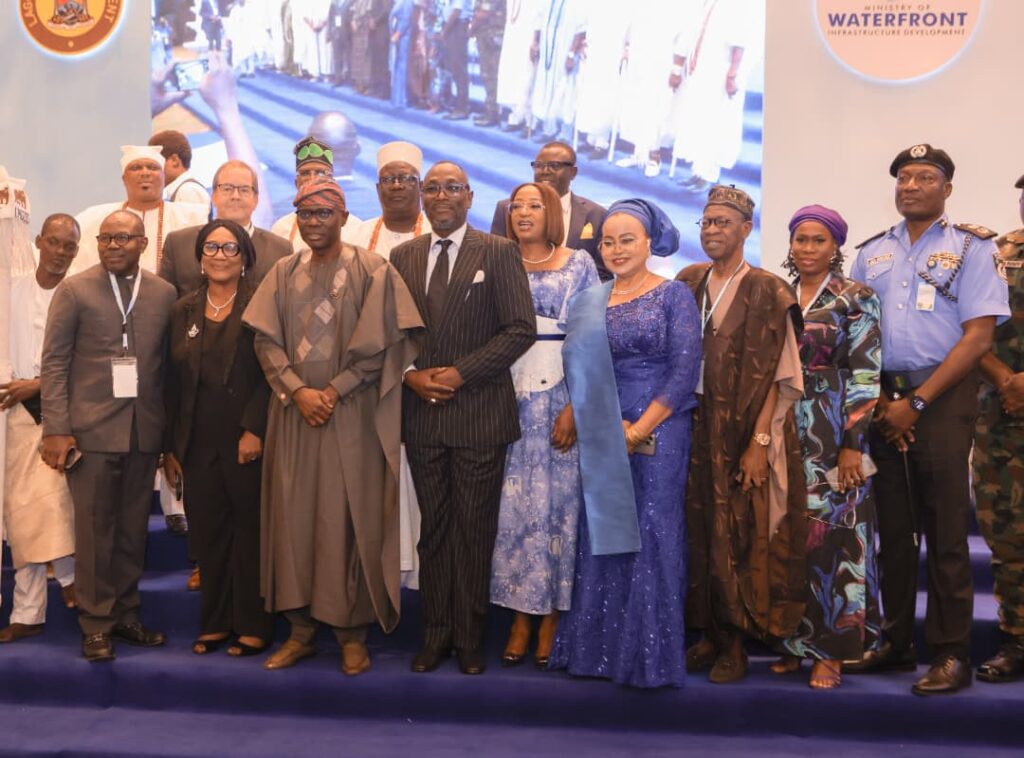…Governor warns Lagos has lost 80% shoreline in 50 years
…Banire insists only resource control, true federalism can save lagoon
…Alebiosu pushes blue economy as state’s future frontier
Lagos’ biggest natural asset, the Lagoon, dominated discussions on Thursday at the maiden Lagos State Waterfront Summit, themed “Pressure on the Lagoon”.
This is as Governor Babajide Sanwo-Olu, legal luminary and former Commissioner for the Environment, Dr. Muiz Banire (SAN), and Commissioner for Waterfront Infrastructure Development, Hon. Ekundayo Alebiosu, all delivered strong messages on urgent action, federal encroachment, and economic opportunities tied to the water body.
Held at Eko Hotel and Suites, Victoria Island, the summit brought together policymakers, traditional rulers, scholars and activists, all united by concerns that reckless dredging, climate change, and weak regulatory powers were fast eroding Lagos’ coastal heritage.
Speaking, Sanwo-Olu warned that Lagos has already lost 80 per cent of its shoreline in 50 years, citing the tragic case of Idotun Village, which “no longer exists today.”
Professor Banire insisted that only true federalism, resource control, and regional autonomy could halt the lagoon’s destruction, accusing Abuja of frustrating Lagos’ rescue efforts.
Alebiosu, meanwhile, framed the lagoon as the new frontier for Lagos’ economy, urging investments in aquaculture, boat transport, eco-tourism, and renewable energy.
Governor Sanwo-Olu also sounded the alarm over the escalating ecological crisis facing Lagos, revealing that the state has lost nearly 80 per cent of its shoreline in just five decades. The Governor blamed unchecked dredging, illegal reclamation, and climate-induced erosion for the devastation.
“Idotun Village in Ibeju-Lekki no longer exists. It has been swallowed by the Atlantic. We cannot afford to fold our arms while more communities disappear,” Sanwo-Olu declared.
The Governor vowed a tougher crackdown on violators, warning that illegal developers and dredgers would face demolition and prosecution.
Beyond enforcement, he said the state was already exploring eco-tourism, tidal energy, aquaculture and green transportation as part of a “blue economy” framework to reposition the lagoon as a sustainable growth engine, stressing also that Lagos’ survival was tied to “Treating water as both a natural heritage and an economic frontier.”
In his speech, Banire warned that federal encroachment remains the greatest obstacle to saving Lagos Lagoon, insisting that only true federalism and resource control can protect the state’s ecological future.
He said, “Over-centralisation of power” has left Lagos unable to properly defend its waterways.
“Every attempt by Lagos to regulate dredging or safeguard the lagoon is met with federal obstruction. Until we return to resource control and regional government, this problem will persist,” Banire declared.
He called for the creation of a Lagos Lagoon Authority, equipped with enforcement powers and backed by a ‘polluter-pays system’, compelling dredgers and developers to contribute to restoration.
Banire further urged the state to engage coastal communities directly, warning that neglecting their voices would undermine conservation.
Earlier in his welcome address, Commissioner Alebiosu described the Lagos Lagoon as the state’s next economic frontier, stressing that sustainable use of the water body could drive jobs, food security, and clean energy.
Alebiosu warned illegal dredgers that they were “engineering their own downfall” by degrading the same resource that sustains them.
“The lagoon is not just water; it is our future. It can feed us through aquaculture, move us through boat transport, and power us through tidal energy. If we mismanage it, we destroy our own survival,” he said.
He outlined a vision where eco-tourism, renewable energy, aquaculture, and cultural preservation converge to form the backbone of Lagos’ “blue economy.”
The Commissioner pledged tighter collaboration with communities and investors, assuring that “sustainability will be the guiding principle” in every waterfront project going forward.















